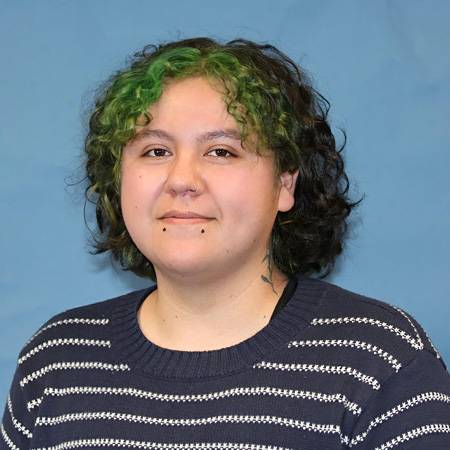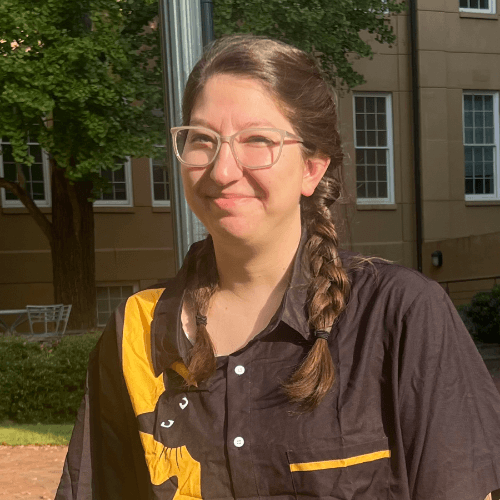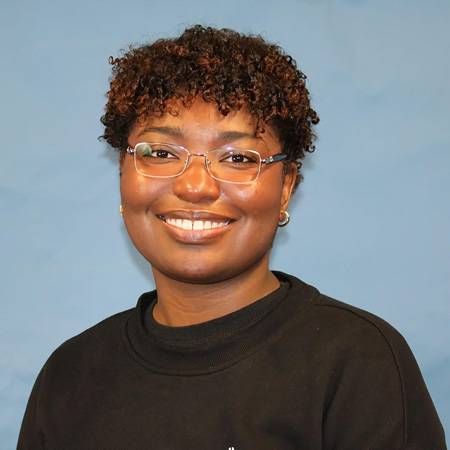Senior Gabriella Petty is a first-generation student with a family history of substance use. As someone who’s
familiar with the impact on individuals and families, she chose Transitions Shelter
for her field internship where she says regularly witnesses the struggles of those
battling addiction.
Gabriella Petty, BSW Senior
For masters student TaKara Jones, the issue is also personal. Addiction runs extensively in both sides of her family and her brother has struggled with anxiety, depression and alcohol use. His difficulties inspired her to pursue helping others with substance abuse.
“Despite the difficulties, I found inspiration in leading with grace, supporting him through his battle and witnessing his resilience,” says Jones. “This experience solidified my passion for working with individuals affected by substance use and sparked my interest in the transformative potential of social work in this field.”
Both social work majors are two of four University of South Carolina students who have been accepted into the Council on Social Work Education’s (CSWE) Substance Use Disorder Education and Leadership Scholars Program. The program’s intent is to enhance education and leadership in substance use disorder prevention, treatment and recovery within social work programs nationwide. Each student receives $2,000 and travel support to attend CSWE’s fellows forum in Washington, DC.

Takara Jones, MSW student
The initiative, funded by the Substance Abuse and Mental Health Services Administration, recognizes the critical role social workers play in addressing the nation’s substance use crisis. The program will provide the College of Social Work with resources to integrate advanced substance use disorder training into its curriculum, furthering development of future social workers equipped to meet the growing demand for expertise in the profession.
Working with the South Carolina Youth Advocate Program, student Cera Hansen found many cases where children had a history of parents struggling with substance use. They were diagnosed with PTSD and struggling with stability in their life, either due to removal from their home or trying to survive in a space with parents struggling in recovery.

Cera Hansen, MSW student
As a third member of the new program, Hansen wants to help children and adolescents overcome substance abuse.
“My primary reason for pursing this area is focusing on prevention in children and adolescents. Prevention in, not telling kids ‘Stay away’ but rather, teaching them the risks of substance use and teaching them how to be safe if they choose to participate,” says Hansen. “Adolescents are more likely to do something if you tell them no, and if we can teach them the correct way to approach substances, we might be able to not only reduce substance use disorders but also limit dangerous behaviors that come about due to substance use like drinking and driving.”
Through the program faculty members and students will complete specialized training, collaborate with national experts and contribute to the development of innovative educational models. It also emphasizes strategies for promoting health equity and culturally responsive care in communities disproportionately affected by substance use disorders.
"We are honored to be part of this initiative," said Teri Browne, dean of the College of Social Work. "This opportunity not only strengthens our commitment to addressing substance use challenges but also empowers our students and faculty to lead the way in evidence-based education and practice."
"Participation in this program aligns perfectly with our mission to prepare social workers for meaningful careers," says MSW Program Director Rhonda DiNovo, who will oversee the program’s implementation at USC. "By integrating this specialized training, we’re not only enhancing our curriculum but also creating opportunities for our students to make a meaningful difference in the lives of individuals and families struggling with substance use."
All four of the students selected for a November 2025 cohort plan on using the education to further help substance abuse disorder clients as a professionals. Javiance Wideman, the fourth student, says she hopes to discover why individuals partake in substance use and to find preventative measures.

Javiance Wideman, BSW Senior
Jones says she wants to further destigmatize usage.
“I’m excited to pursue initiatives that support children impacted by parental substance use, develop programs for middle schoolers facing peer pressure and anxiety and foster resilience in families,” says Jones. “Ultimately, I want to be part of a broader movement to destigmatize addiction and promote recovery-focused social work.”
As for Petty, her goal is simple: “I aim to create a meaningful change - whether it's by helping one person or many.”
For more information about the Substance Use Disorder Education and Leadership Scholars Program, visit the CSWE website.